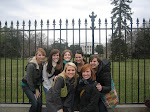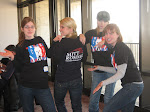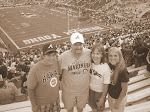 I am in a book club. I know what you're thinking--old, Relief Society women sitting around enjoying treats and talking about their feelings. BUT--this is a little different. I'm in a Social Sciences book club in my school district for relicensure points and lane change credits. AKA--for an eventual raise. :) We read one book a month. Last month's book was Long Walk to Freedom by Nelson Mandela. I prefer to call him Ol' Nelly now that I've spent approximately 625 pages with him (and, yes, I read every single one). Now, after seeing Invictus, I was so excited for the Rugby part to come. I waited, and waited, and waited. It never came. I would recommend this book. It was really great and very enlightening. I can't believe that he really, truly spent almost 3 decades of his life in prison. Can you imagine? Wow. Nelson Mandela is an incredible person. These are a few of my favorite thoughts (or most thought provoking) of ol' Nelly.
I am in a book club. I know what you're thinking--old, Relief Society women sitting around enjoying treats and talking about their feelings. BUT--this is a little different. I'm in a Social Sciences book club in my school district for relicensure points and lane change credits. AKA--for an eventual raise. :) We read one book a month. Last month's book was Long Walk to Freedom by Nelson Mandela. I prefer to call him Ol' Nelly now that I've spent approximately 625 pages with him (and, yes, I read every single one). Now, after seeing Invictus, I was so excited for the Rugby part to come. I waited, and waited, and waited. It never came. I would recommend this book. It was really great and very enlightening. I can't believe that he really, truly spent almost 3 decades of his life in prison. Can you imagine? Wow. Nelson Mandela is an incredible person. These are a few of my favorite thoughts (or most thought provoking) of ol' Nelly."Education is the great engine of personal development. It is through education that the daughter of a peasant can become a doctor, that the son of a mineworker can become the head of the mine, that a child of farmworkers can become the president of a great nation. It is what we make out of what we have, not what we are given, that separates one person from another. (p. 166)
"A philosopher once noted taht something is odd if a person is not liberal when he is young and conservative when he is old. I am not a conservative, but one matures and regards some of the views of one's youth as undeveloped and callow." (haha. p. 228)
"Poverty and the breakdown of family life have secondary effects. Children wanter about the streets of the townships because they have no schools to go to, or no money to enable them to go to school, or no parents at home to see that they go to school, because both parents (if there be two) have to work to keep the family alive. This leads to a breakdown in moral standards, to an alarming rise in illegitimacy and to growing violence which erupts, not only politically, but everywhere..." (p. 368)
I've never really thought about the purpose of prison before. Apparently Mandela had a little more time to. Interesting thoughts: "Prison is desigend to break one's spirit and destroy one's resolve. To do this, the authorities attempt to exploit every weakness, demolish every initiative, n egate all signs of individuality--all with the idea of stamping out that spark that makes each of us human and each of us who we are." (p. 390)
 "I am fundamentally an optimist. Whethere that comes from nature or nurture, I cannot say. part of being optimistic is keeping one's head pointed toward the sun, one's feet moving forward. THere were many dark moments when my faith in humanity was sorely tested, but I would not and could not give myself up to despair. That way lay defeat and death." (p. 391)
"I am fundamentally an optimist. Whethere that comes from nature or nurture, I cannot say. part of being optimistic is keeping one's head pointed toward the sun, one's feet moving forward. THere were many dark moments when my faith in humanity was sorely tested, but I would not and could not give myself up to despair. That way lay defeat and death." (p. 391)Speaking after his son's death while in prison, "What can one say about such a tragedy? I was already overwrought about my wife, I was still grieving for my mother, and then to hear such news...I do not have the words to express the sorrow, or the loss I felt. It left a whole in my heart that can never be filled." (p. 447) This just reminded me that the great Freedom Fighter was a human.
One of my favorites: "I never lost hope that this great transformation would occur. Not only because of the great heroes I have already cited, but because of the courage of the ordinary men and women of my country. I always knew that deep down in every human heart, there is mercy and generosity. No one is born hating another person because of the color of his skin, or his background, or his religion. People must learn to hate, and if they can learn to hate, they can be taught to love, for love comes more naturally to the human heart than its opposite. " (p. 622)
My recommendation: Read it. Or at least read this version.
 We can overcome rascism. I know it.
We can overcome rascism. I know it.







1 comment:
I noticed you were reading the Screwtape letters! LOVE, LOVE, LOVE IT!!!
Post a Comment